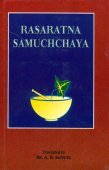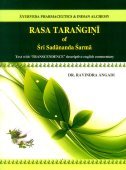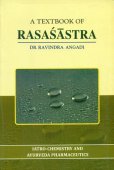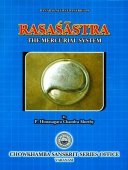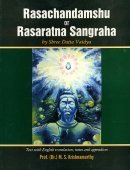Maharasa, Mahārasa, Maha-rasa: 9 definitions
Introduction:
Maharasa means something in Hinduism, Sanskrit, biology. If you want to know the exact meaning, history, etymology or English translation of this term then check out the descriptions on this page. Add your comment or reference to a book if you want to contribute to this summary article.
In Hinduism
Ayurveda (science of life)
Rasashastra (Alchemy and Herbo-Mineral preparations)
Source: Wisdom Library: Rasa-śāstra1) Mahārasa and Uparasa, (translated as ‘mercuries’) are two groups of alchemical mineral agents, according to the Rasaśāstroddhṛti (Sanskrit alchemical work). These two groups of minerals (or rocks that contain minerals) are involved in ‘purifying’ and ‘killing’ metals, as well as eliminating the poisonous components of mercury. Therefore, they are also called the ‘devourer elements’.
According to the Rasasiddhiśāstra, the seven mahārasa are:
- ‘chalcopyrite’ (gser zil rdo),
- ‘iron pyrite’ (dri med rdo),
- thuthuka (tutthaka) or ‘copper sulphate’,
- mercury,
- cinnabar,
- masaka (mākṣika, or, maksika) or ‘copper pyrite’,
- and ‘the one which moves’ (g.yo byed);
2) Mahārasa (महारस):—The name of a group of eighth minerals consisting of superior properties, according to the Rasaprakāśasudhākara: a 13th century Sanskrit book on Indian alchemy, or, Rasaśāstra.
These are the names of the eighth minerals (Sanskrit name first, english name in brackets):
- Abhraka/Gagana (‘mica’),
- Rājāvarta (‘lapis lazuli’),
- Vaikrānta (‘turmaline’/‘manganese ore’),
- Sasyaka (‘copper sulphate ore’/‘blue vitriol’),
- Tāpya/Mākṣika (‘chalcopyrite’),
- Vimala (‘iron pyrite’),
- Śailasaṃbhūta/Śilājatu (‘asphalt’/‘mineral pitch’/‘bituman’),
- Rasaka/Kharpara (‘zine blend’/‘zinc ores’/‘calamine’).
Mahārasa (महारस) refers to “eight metals which are considered superior in processing mercury”, and mentioned in the Rasaratnasamuccaya: a 13th century C.E. alchemical treatise, authored by Vāgbhaṭa, is a useful compilation related to preparation and properties of drugs of mineral and metallic origin.

Āyurveda (आयुर्वेद, ayurveda) is a branch of Indian science dealing with medicine, herbalism, taxology, anatomy, surgery, alchemy and related topics. Traditional practice of Āyurveda in ancient India dates back to at least the first millenium BC. Literature is commonly written in Sanskrit using various poetic metres.
Biology (plants and animals)
Source: Wisdom Library: Local Names of Plants and DrugsMaharasa [महारसा] in the Sanskrit language is the name of a plant identified with Indigofera tinctoria L. from the Fabaceae (Pea) family having the following synonyms: Indigofera indica Lam., Indigofera sumatrana. For the possible medicinal usage of maharasa, you can check this page for potential sources and references, although be aware that any some or none of the side-effects may not be mentioned here, wether they be harmful or beneficial to health.

This sections includes definitions from the five kingdoms of living things: Animals, Plants, Fungi, Protists and Monera. It will include both the official binomial nomenclature (scientific names usually in Latin) as well as regional spellings and variants.
Languages of India and abroad
Sanskrit dictionary
Source: DDSA: The practical Sanskrit-English dictionaryMahārasa (महारस).—a. very savoury. (-saḥ) 1 a sugarcane.
2) quicksilver.
3) a precious mineral.
4) the fruit of the date tree.
5) any one of the eight substances given below :-दरदः पारदं शस्ये वैक्रान्तं कान्तमभ्रकम् । माक्षिकं विमलश्चेति स्युरेतेऽष्टौ महारसाः (daradaḥ pāradaṃ śasye vaikrāntaṃ kāntamabhrakam | mākṣikaṃ vimalaśceti syurete'ṣṭau mahārasāḥ) ||
-sam sour ricewater.
Mahārasa is a Sanskrit compound consisting of the terms mahā and rasa (रस).
Source: Cologne Digital Sanskrit Dictionaries: Shabda-Sagara Sanskrit-English DictionaryMahārasa (महारस).—m.
(-saḥ) 1. The date tree, (Phœnix sylvestris.) 2. A species of club rush, (Scirpus kysoor.) 3. Any precious mineral. 4. Quicksilver. n.
(-raṃ) Gruel made from the fermentation of rice-water. E. mahā great, rasa juice.
Source: Cologne Digital Sanskrit Dictionaries: Monier-Williams Sanskrit-English Dictionary1) Mahārasa (महारस):—[=mahā-rasa] [from mahā > mah] m. ‘precious mineral’ (Name of 8 metals or minerals used in med°), [Catalogue(s); cf. Lexicographers, esp. such as amarasiṃha, halāyudha, hemacandra, etc.]
2) [v.s. ...] quicksilver, [cf. Lexicographers, esp. such as amarasiṃha, halāyudha, hemacandra, etc.]
3) [v.s. ...] flavour, [Rāmāyaṇa]
4) [v.s. ...] mfn. having much fl°, very savoury, [Mahābhārata]
5) [v.s. ...] m. a sugar-cane, [cf. Lexicographers, esp. such as amarasiṃha, halāyudha, hemacandra, etc.]
6) [v.s. ...] Phoenix Sylvestris, [cf. Lexicographers, esp. such as amarasiṃha, halāyudha, hemacandra, etc.]
7) [v.s. ...] Scirpus Kysoor, [cf. Lexicographers, esp. such as amarasiṃha, halāyudha, hemacandra, etc.]
8) Mahārasā (महारसा):—[=mahā-rasā] [from mahā-rasa > mahā > mah] f. Indigofera Tinctoria, [cf. Lexicographers, esp. such as amarasiṃha, halāyudha, hemacandra, etc.]
9) [v.s. ...] Clitoria Ternatea, [cf. Lexicographers, esp. such as amarasiṃha, halāyudha, hemacandra, etc.]
10) [v.s. ...] Evolvulus Alsinoides, [cf. Lexicographers, esp. such as amarasiṃha, halāyudha, hemacandra, etc.]
11) Mahārasa (महारस):—[=mahā-rasa] [from mahā > mah] n. sour rice-water, [cf. Lexicographers, esp. such as amarasiṃha, halāyudha, hemacandra, etc.]
Source: Cologne Digital Sanskrit Dictionaries: Yates Sanskrit-English DictionaryMahārasa (महारस):—[mahā-rasa] (saḥ) 1. m. The date tree; a club rush; rice gruel.
[Sanskrit to German]
Sanskrit, also spelled संस्कृतम् (saṃskṛtam), is an ancient language of India commonly seen as the grandmother of the Indo-European language family (even English!). Closely allied with Prakrit and Pali, Sanskrit is more exhaustive in both grammar and terms and has the most extensive collection of literature in the world, greatly surpassing its sister-languages Greek and Latin.
See also (Relevant definitions)
Partial matches: Maha, Rasa, Raca.
Starts with: Maharasa-karana, Maharasavant, Maharasavati, Maharasayanavidhi.
Ends with: Ashtamaharasa.
Full-text (+33): Maharasavati, Uparasa, Maharasayanavidhi, Maharasavant, Maharasa-karana, Rasaka, Makaracam, Rasakomala, Ashtamaharasa, Sasyaka, Bimala, Talatala, Vaikranta, Vimala, Rajatamakshika, Abhraka, Susamvita, Shailasambhuta, Kamsyavimala, Hemavimala.
Relevant text
Search found 5 books and stories containing Maharasa, Mahārasa, Maha-rasa, Mahā-rasa, Mahārasā, Mahā-rasā; (plurals include: Maharasas, Mahārasas, rasas, Mahārasās, rasās). You can also click to the full overview containing English textual excerpts. Below are direct links for the most relevant articles:
Brihad Bhagavatamrita (commentary) (by Śrī Śrīmad Bhaktivedānta Nārāyana Gosvāmī Mahārāja)
Verse 2.2.222 < [Chapter 2 - Jñāna (knowledge)]
Rasa Jala Nidhi, vol 1: Initiation, Mercury and Laboratory (by Bhudeb Mookerjee)
Part 1 - Synonyms and Characteristics of Parada (mercury) < [Chapter III - Parada (Mercury)]
Amarakoshodghatana of Kshirasvamin (study) (by A. Yamuna Devi)
Daily Life (1): Food and Drinks < [Chapter 3 - Social Aspects]
Rasa Jala Nidhi, vol 5: Treatment of various afflictions (by Bhudeb Mookerjee)
Sri Krishna-Chaitanya (by Nisikanta Sanyal)
Chapter 3 - The Highest Worship of Sri Krishna < [Volume I - Introductory]
Related products

